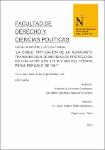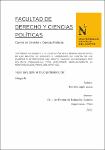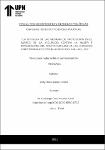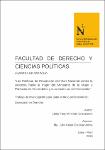Mostrar el registro sencillo del ítem
La doble tipificación de la agravante transgresión de medidas de protección en los artículos 122-B y 368 del Código Penal peruano de 1991
| dc.contributor.advisor | Tello Villanueva, Juan Carlos | |
| dc.contributor.author | Sanchez Sotomayor, Ana Maria | |
| dc.contributor.author | Vasquez Alvarado, Samanta Estefany | |
| dc.date.accessioned | 2023-07-11T13:19:27Z | |
| dc.date.available | 2023-07-11T13:19:27Z | |
| dc.date.issued | 2023-02-26 | |
| dc.identifier.citation | Sanchez, A. M., & Vasquez, S. E. (2023). La doble tipificación de la agravante transgresión de medidas de protección en los artículos 122-B y 368 del Código Penal peruano de 1991 [Tesis de licenciatura, Universidad Privada del Norte]. Repositorio de la Universidad Privada del Norte. https://hdl.handle.net/11537/33774 | es_PE |
| dc.identifier.other | 340.56 SANC 2023 | es_PE |
| dc.identifier.uri | https://hdl.handle.net/11537/33774 | |
| dc.description | El informe de similitud se encuentra ubicado en el último archivo con acceso restringido; además, como parte de los metadatos, se incluye el porcentaje de similitud (opción Mostrar el registro completo del ítem). | |
| dc.description.abstract | El delito de Agresiones en contra de la mujer o integrantes del grupo familiar agravada, artículo 122-B, numeral 6, del Código Penal, contempla un supuesto de hecho similar al del delito de Resistencia o desobediencia a la autoridad, artículo 368, parte final, de este mismo cuerpo normativo; eso sí, con sanciones penales de diferente magnitud. En el primer ilícito el Legislativo prescribió una sanción de pena privativa de libertad de no menor de dos ni mayor de tres años; y en el caso del segundo ilícito, la pena privativa de libertad versa entre no menor de cinco y mayor de ocho años. Ahora bien, al existir dos regulaciones normativas para un mismo hecho, estamos hablando de las agresiones en contra de la mujer o integrantes del grupo familiar, contraviniendo las medidas de protección previamente dictadas por el órgano jurisdiccional competente, a favor del perjudicado, se tiene que los operadores del derecho, tanto magistrados como abogados, se situan en incertidumbre sobre la utilización correcta del tipo penal, en el supuesto antes indicado. La hipótesis planteada al inicio del trabajo de investigación fue que al presentarse dos tipos penales aplicables para un solo hecho fáctico, se está ante un concurso aparente de leyes o concurso aparente de tipos penales. Al avanzar y desarrollar la tesis, la hipótesis se confirmó, por lo que se utilizó el principio de especialidad para aplicar el delito de Agresiones en contra de las mujeres o integrantes del grupo familiar agravada, cuando se agrede a una mujer o integrante familiar, pese a que tiene a su favor medidas de protección; desplazando el delito de Resistencia o desobediencia a la autoridad. | es_PE |
| dc.description.abstract | The crime of aggravated aggression against women or members of the family group, article 122-B, numeral 6, of the Penal Code, contemplates a factual assumption similar to that of the crime of resistance or disobedience to authority, article 368, final part , of this same regulatory body; yes, with criminal sanctions of different magnitude. In the first offense, the Legislature prescribed a custodial sentence of not less than two nor more than three years; and in the case of the second offense, the custodial sentence ranges from no less than five to more than eight years. Now, since there are two normative regulations for the same fact, we are talking about aggressions against women or members of the family group, contravening the protection measures previously issued by the competent jurisdictional body, in favor of the injured party, it has to be the operators of the law, both magistrates and lawyers, are in uncertainty about the correct use of the criminal type, in the case indicated above. The hypothesis raised at the beginning of the research work was that when presenting two applicable criminal types for a single factual fact, there is an apparent contest of laws or apparent contest of criminal types. When advancing and developing the thesis, the hypothesis was confirmed, so the principle of specialty was used to apply the crime of aggression against women or members of the aggravated family group, when a woman or family member is attacked, despite that it has protection measures in its favor; displacing the crime of resistance or disobedience to authority. | es_PE |
| dc.description.uri | Tesis | es_PE |
| dc.format | application/pdf | es_PE |
| dc.format | application/msword | |
| dc.language.iso | spa | es_PE |
| dc.publisher | Universidad Privada del Norte | es_PE |
| dc.rights | info:eu-repo/semantics/openAccess | es_PE |
| dc.rights | Atribución-NoComercial-CompartirIgual 3.0 Estados Unidos de América | * |
| dc.rights.uri | https://creativecommons.org/licenses/by-nc-sa/3.0/us/ | * |
| dc.source | Universidad Privada del Norte | es_PE |
| dc.source | Repositorio Institucional - UPN | es_PE |
| dc.subject | Derecho civil | es_PE |
| dc.subject | Derechos de la mujer | es_PE |
| dc.subject | Violencia familiar | es_PE |
| dc.subject | Medida cautelar | es_PE |
| dc.subject | Código penal | es_PE |
| dc.subject | Concurso aparente de leyes | es_PE |
| dc.subject | Agresiones en contra de las mujeres | es_PE |
| dc.subject | Resistencia o desobediencia a la autoridad | es_PE |
| dc.subject | Medidas de protección | es_PE |
| dc.subject | Apparent competition of laws | es_PE |
| dc.subject | Aggressions against women | es_PE |
| dc.subject | Resistance or disobedience to authority | |
| dc.subject | Protection measures | |
| dc.title | La doble tipificación de la agravante transgresión de medidas de protección en los artículos 122-B y 368 del Código Penal peruano de 1991 | es_PE |
| dc.type | info:eu-repo/semantics/bachelorThesis | es_PE |
| thesis.degree.grantor | Universidad Privada del Norte. Facultad de Derecho y Ciencias Políticas | es_PE |
| thesis.degree.level | Título Profesional | es_PE |
| thesis.degree.discipline | Derecho y Ciencias Políticas | es_PE |
| thesis.degree.name | Abogado | es_PE |
| dc.publisher.country | PE | es_PE |
| dc.subject.ocde | https://purl.org/pe-repo/ocde/ford#5.05.01 | es_PE |
| thesis.degree.program | Pregrado | es_PE |
| dc.description.sede | Cajamarca | es_PE |
| renati.advisor.dni | 43570003 | |
| renati.advisor.orcid | https://orcid.org/0000-0003-4256-0738 | es_PE |
| renati.author.dni | 72711248 | |
| renati.author.dni | 72761828 | |
| renati.discipline | 421056 | es_PE |
| renati.juror | Villegas Salazar, Saúl Alexander | |
| renati.juror | Vargas Carrera, Juan | |
| renati.juror | Mejía Plascencia, Luis Franco | |
| renati.level | http://purl.org/pe-repo/renati/level#tituloProfesional | es_PE |
| renati.type | http://purl.org/pe-repo/renati/type#tesis | es_PE |
| dc.relation.conformsto | 19% | es_PE |
Ficheros en el ítem
Este ítem aparece en la(s) siguiente(s) colección(ones)
-
Tesis [836]









